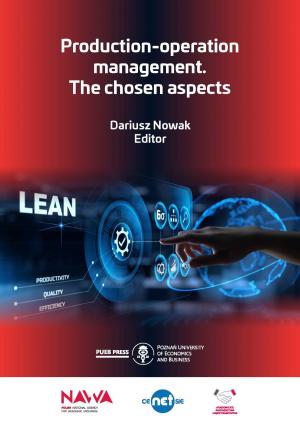Redakcja naukowa
Dariusz Nowak
Production–operation management. The chosen aspects
Dostępność i zakup
Wersja elektroniczna(IBUK)Wersja elektroniczna
(CEEOL)
*Kliknięcie przycisku powoduje przeniesienie na zewnętrzną platformę udostępniania lub sprzedaży.
Książka jest dostępna w subskrypcjach bibliotecznych: Ibuk Libra i EBSCO.
Nowak, D. (red.). (2021). Production–operation management. The chosen aspects. Wydawnictwo Uniwersytetu Ekonomicznego w Poznaniu. https://doi.org/10.18559/978-83-8211-059-3
PREFACE
Dariusz Nowak, Iskra Panteleeva
1. THE NATURE OF THE INDUSTRIAL ENTERPRISE
1.1. Introduction
1.2. Concept of an industrial enterprise
1.3. The features of industrial enterprises
1.4. Goals and tasks of an industrial enterprise
1.5. Company functions
1.6. Typology of the industrial enterprises
1.7. The features of industrial market
Aneta Deneva, Iskra Panteleeva
2. THE OPERATIONAL MANAGEMENT EVOLUTION AND ITS ROLE IN THE INDUSTRIAL ENTERPRISE
2.1. Introduction
2.1. Definition of operational management
2.3. Levels of operational management
2.4. The principles of operational management
2.5. Production systems and its elements
2.6. Organization of the production process (best practices)
Bartosz Marcinkowski
3. FUNCTIONS AND ROLES IN OPERATIONS MANAGEMENT
3.1. Introduction
3.2. Organization of production processes
3.3. Enterprise Resource Planning
3.4. Purchasing management
3.5. Production capacity
3.6. Inter-organizational cooperation
Aneta Deneva, Sebastian Narojczyk
4. TRADITIONAL METHODS USED IN OPERATIONAL ACTIVITIES
4.1. Introduction
4.2. Benchmarking
4.3. Outsourcing
4.4. Core competencies
4.5. Just-In-Time (JIT)
4.6. Material Requirements Planning (MRP or MRP I)
4.7. Manufacturing Resources Planning (MRP II)
4.8. Total Quality Management (TQM)
4.9. Kaizen
Bartosz Marcinkowski, Sebastian Narojczyk, Dariusz Nowak, Vasyl Zalizko
5. THE MODERN METHODS USED IN PRODUCTION-OPERATIONS MANAGEMENT
5.1. Introduction
5.2. Shop Floor Control
5.3. Cooperative manufacturing
5.4. Environment-conscious manufacturing (ECM) and life-cycle assessment (LCA)
5.5. Waste management and recycling
5.6. Electronic Data Interchange (EDI)
5.7. Virtual enterprise
5.8. World Class Manufacturing (WCM)
5.9. Quality Function Deployment (QFD) and House of Quality (HOQ)
5.10. Theory of constraints (TOC)
5.11. Drum Buffer Rope (DBR)
5.12. Group technology (GT) and cellular manufacturing (CM)
5.13. Demand Chain Management (DCM)
5.14. Competitive intelligence (CI)
5.15. Statistical Process Control (SPC) and Computer-Aided Process Planning (CAPP)
Natalia Mazur, Dariusz Nowak, Vasyl Zalizko
6. PROBLEMS OF SUSTAINABLE DEVELOPMENT AND CHALLENGES RELATED TO PRODUCTION AND OPERATIONS MANAGEMENT
6.1. Introduction
6.2. Environmental changes
6.2.1. Depletion of natural resources
6.2.2. Fossil fuels and global warming
6.2.3. Waste, air, water and land pollution
6.2.4. Problems related to environmental pollution
6.3. Globalization in operation activities
6.4. Technical progress in production-operation management
6.5. The impact of innovation on production and operation activities
6.6. Qualifications, competences and human capital in the production-operation processes
The aim of the e-book is to present the theoretical, cognitive and practical aspects of the essence and complexity of operational management in a production company. The presented modern production methods together with the challenges and problems of contemporary enterprises should better help to understand the issues of sustainable development, with particular emphasis on waste. The book consists of six chapters devoted to relevant and topic issues relating to the core business of an industrial enterprise. Chapter 1 The nature of the industrial enterprise is an introduction to further considerations and deals with the essence of the basic aspects of the company. Both popular and less known definitions of an enterprise, its features, functions and principles of operation are presented. An important part of the chapter is the presentation and formulation of strategic, tactical and operational goals. Moreover, the division of enterprises is presented with the use of various criteria and the features of the industrial market, which make it distinct. Chapter 2 The operational management evolution and its role in the industrial enterprise discusses the evolution and concept of production and operational management. The management levels were also presented, indicating their most important functions. An integral part of the chapter is the essence of the production system, viewed through the prism of the five elements. Chapter 3 Functions and role in operations management presents the issues concerning the organization of production processes, production capacity and inventory management. This part also presents considerations on cooperation and collaboration between enterprises in the process of creating value. Chapter 4 Traditional methods used in operational activities focuses on methods such as benchmarking, outsourcing, core competences, JIT, MPR I and MRP II, as well as TQM and kaizen. Knowledge of these methods should contribute to understanding the activities of modern enterprises, the way of company functioning, the realization of production activities, as well as aspects related to building a competitive position. Chapter 5 Modern methods used in production-operations management discusses the less common and less frequently used production methods, based on a modern and innovative approach. In particular, it was focused on: Shop Floor Control and cooperative manufacturing, environment-conscious manufacturing (ECM) and life-cycle assessment ( LCA), waste management and recycling, Electronic Data Interchange (EDI), virtual enterprise, World Class Manufacturing (WCM), Quality Function Deployment (QFD) and House of Quality (HOQ), theory of constraints (TOC), Drum Buffer Rope (DBR), group technology (GT) and cellular manufacturing (CM), Demand Chain Management and competitive intelligence (CI). In the last section discusses: the role of sustainable statistical process control and Computer-Aided Process Planning in context formatting of information management. Chapter 6 Problems of sustainable development and challenges related to production and operations management describes the problem and challenges related to production and operations activities. In particular, attention was paid to the threats related to changes in global warming, the growing scale of waste, or the processes of globalization. It was pointed out that the emerging problem may be both a threat and a chance for the development of enterprises. An integral part of the chapter are also considerations on technical progress, innovation and the importance of human capital in operational activities.
Rozdziały:

Metadane
- ISBN: 978-83-8211-059-3
- DOI: 10.18559/978-83-8211-059-3
- Wydanie: I
- Rok wydania: 2021
- Rok premiery: 2021
- Strony: 230
- Wersja papierowa:
- Wersja elektroniczna: pdf
- Format: B5
- Licencja: open access
enterprises, industrial enterprises, operational management, production process, good practices in organization, methods of production activity, sustainable development, technical progress and innovation, human resources management
ostatni tydzień: 37
ostatnie 3 miesiące: 508
ogółem: 2940



 Pełna wersja do pobrania (pdf)
Pełna wersja do pobrania (pdf) Abstract
Abstract